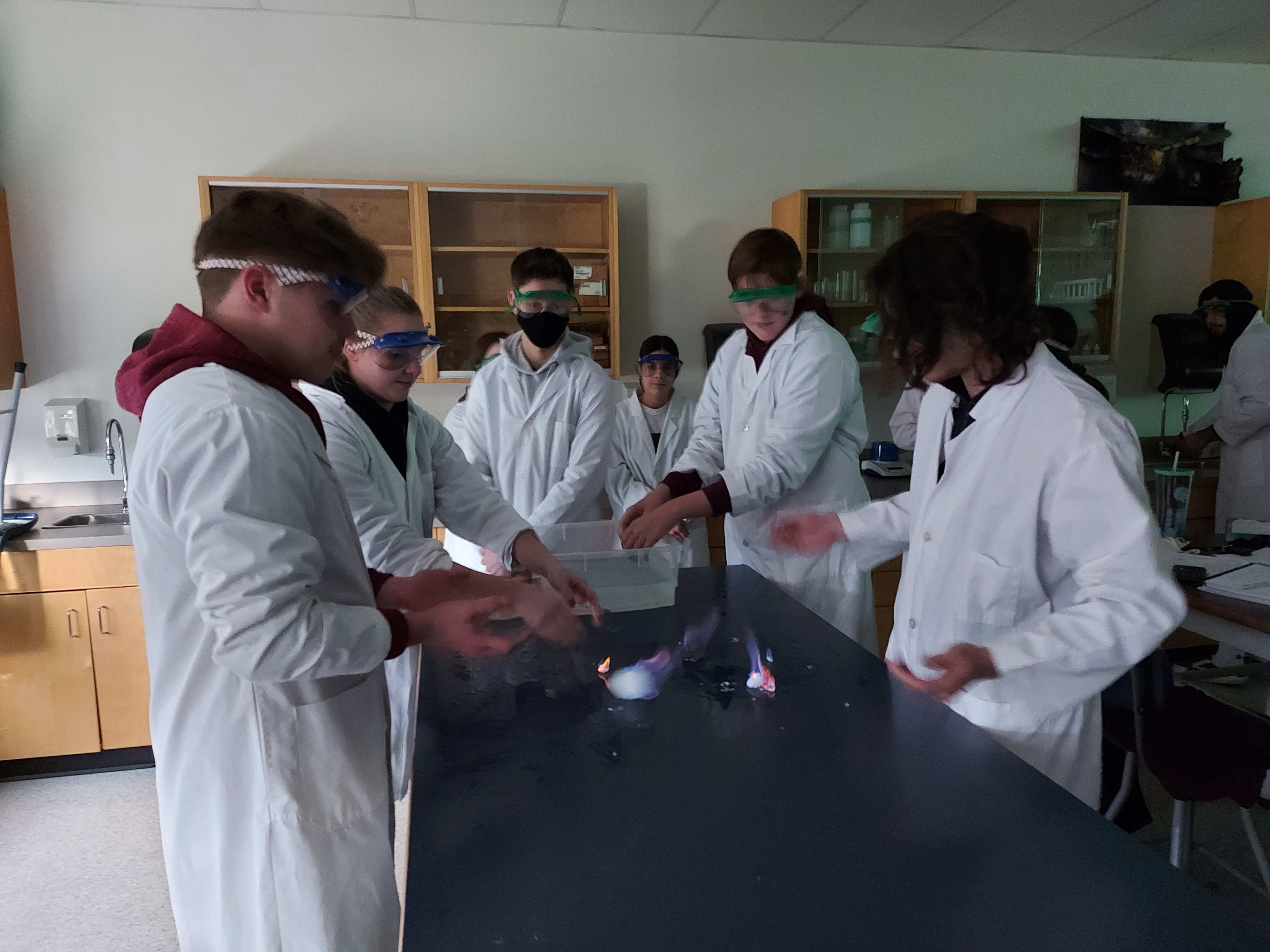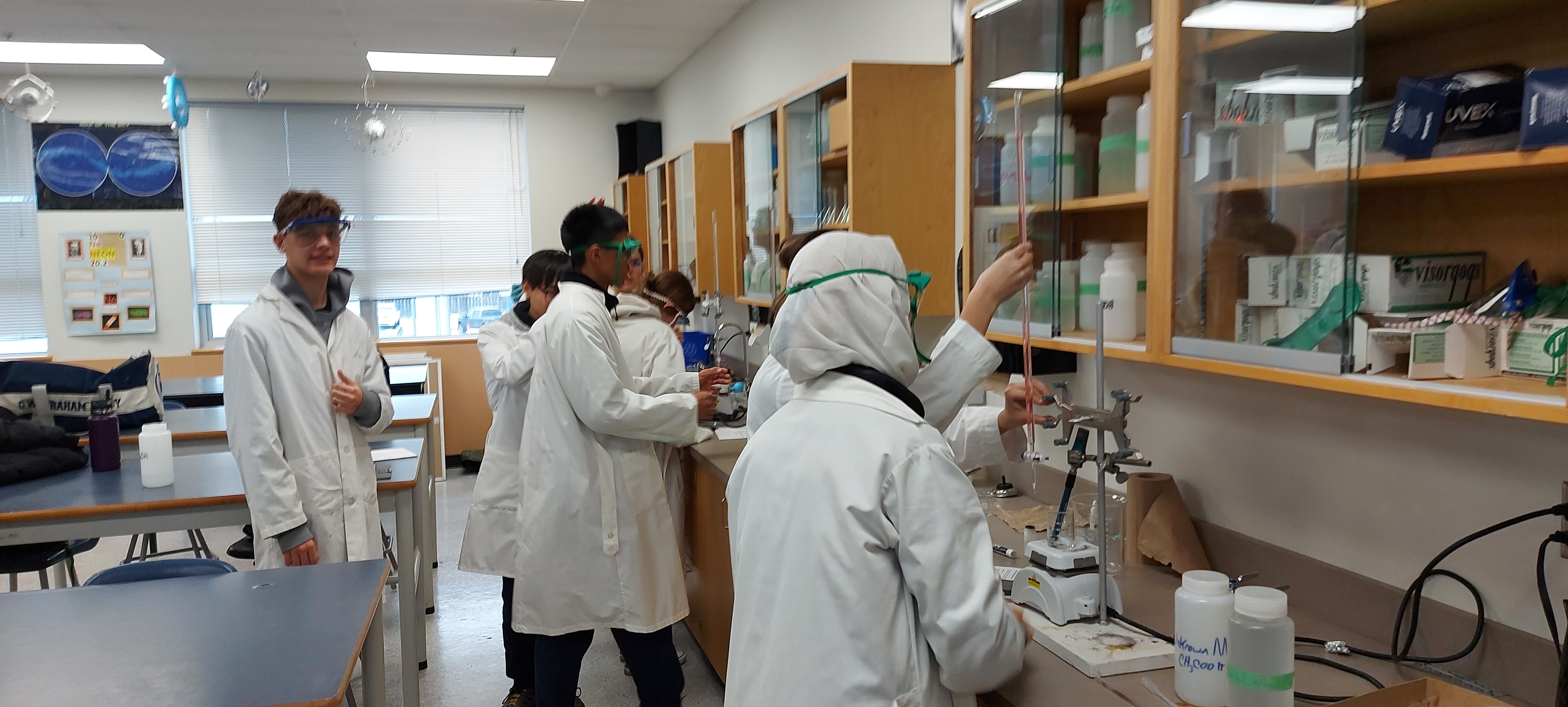AP BIOLOGY
Are you curious about how life works—from the smallest cell to entire ecosystems? Do you see yourself pursuing a future in health sciences, medicine, or research? AP Biology offers motivated students the opportunity to explore biology at a university level while still in high school.
This rigorous, college-level course goes beyond memorization. Students explore the scientific principles, theories, and processes that govern living systems and the natural world. Through hands-on laboratory investigations, they develop essential skills in experimental design, data collection, analysis, and scientific reasoning. Students are encouraged to ask questions, form hypotheses, and refine their thinking based on real evidence—just like real scientists do.
AP Biology emphasizes collaboration and critical thinking. Students work together to tackle complex problems and apply their knowledge in new, meaningful ways. It’s an ideal course for students with a strong work ethic and a genuine interest in the biological sciences.
This course is especially recommended for Grade 11 or 12 students considering future studies in Health Sciences, Medicine, Nursing, Dentistry, Physiotherapy, Microbiology, or any other life science field.
An added bonus: students will also cover the full curriculum of Anatomy & Physiology 12, and upon successful completion, will earn credit for both AP Biology and Anatomy & Physiology 12 (8 credits!)
Prerequisites:
- Science 10
- Plus, one of the following: Life Sciences 11, Life Sciences 11 Honours, or Anatomy & Physiology 12
- Chemistry 11 is highly recommended as a pre- or co-requisite
Take the leap into AP Biology—and uncover the fascinating mechanics of life while building a solid foundation for your future in science.
Students may choose to write the College Board AP exam in May (approx. $130 CAD); strong scores of a 4 or 5 can earn first-year university credit.
For further information: https://apstudents.collegeboard.org/courses/ap-biology
AP CHEMISTRY
Are you fascinated by how the world works at a molecular level? Do you enjoy experimenting in the lab and solving complex problems? AP Chemistry is a challenging and rewarding course designed for students who are passionate about science and ready to take their learning to the next level.
This introductory college-level course dives deep into four major areas: scale, proportion, and quantity; structure and properties of substances; transformations; and energy. Through inquiry-based labs and real-world applications, students build a strong foundation in chemistry while developing critical thinking, collaboration, and analytical skills essential for success in STEAM (Science, Technology, Engineering, Arts, and Math) pathways.
AP Chemistry prepares students for the academic demands of post-secondary science programs. It’s ideal for students considering careers in medicine, engineering, environmental science, pharmacology, or any science-based field.
To align with both the BC Provincial Curriculum and the AP Program, AP Chemistry is offered as a full-year course split into two parts:
Semester 1 – Chemistry 12 (4 credits):
Students begin with Chemistry 12, a rigorous and lab-intensive course that builds on the foundation from Chemistry 11. Chemistry 12 covers key concepts that directly align with the AP framework, serving as the first half of the AP Chemistry experience. Upon completion, students receive full credit for Chemistry 12.
Semester 2 – AP Chemistry (4 credits):
In the second semester, students dive into university-level topics including atomic theory, the nature of light, gas laws, reaction rates, and thermodynamics. Students complete advanced lab work using equipment and techniques often reserved for first-year university courses. The semester culminates in focused preparation for the AP Chemistry Exam, administered by the College Board. But the value of this course goes far beyond the exam—students leave AP Chemistry with a deeper understanding of the subject and the skills to thrive in demanding academic environments.
Prerequisites and Recommendations:
- Required: Chemistry 11 or Chemistry 11 Honours
- Strongly Recommended: Chemistry 12 taken in Semester 1 of the same year
Chemistry 11 Honours is recommended for students aiming for AP Chemistry, as it offers faster pacing and exposure to AP-level concepts. However, students who have completed standard Chemistry 11 are still fully eligible and well-supported in this course.
Students may choose to write the College Board AP exam in May (approx. $130 CAD); strong scores of a 4 or 5 can earn first-year university credit.
For further information: https://apstudents.collegeboard.org/courses/ap-chemistry


AP PHYSICS 1
Are you fascinated by the arc of a basketball, the pull of gravity, or how machines work? AP Physics 1 explores the forces and principles that shape our world—equipping students with the tools to think like scientists and solve real-world problems through experimentation and critical analysis.
This algebra-based college course covers essential physics topics including kinematics, dynamics, energy, momentum, circular motion, gravitation, equilibrium and torque, rotation, waves, harmonic motion, and fluids. Along the way, students investigate how objects move, interact, and respond to forces—all through hands-on, inquiry-based labs that mirror the work of real physicists. With lots of lab work, students develop advanced skills in experimental design, data interpretation, and scientific reasoning.
As the year progresses, learners move from foundational concepts like velocity and acceleration to more complex ideas like rotational motion and fluid dynamics. Each unit builds the analytical thinking, problem-solving ability, and scientific literacy required for success in post-secondary science and engineering programs.
This course is ideal for students interested in engineering, health sciences, environmental studies, robotics, and other STEM pathways. If you’re ready to challenge yourself and explore the mechanics of the universe, AP Physics 1 is the perfect place to begin.
Students may choose to write the College Board AP exam in May (approx. $130 CAD); strong scores of a 4 or 5 can earn first-year university credit.
For further information: https://apstudents.collegeboard.org/courses/ap-physics-1-algebra-based

